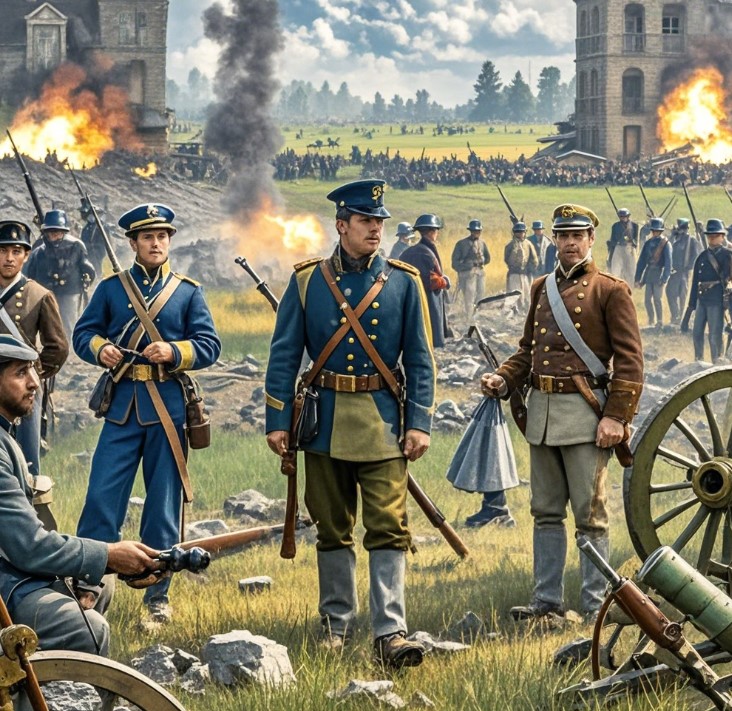Chapter 3 walk and stood
I stood on the balcony, gazing out at the vast expanse of the Hamilton plantation. This was the heart of Virginia, where lush green tobacco fields sparkled with dew in the morning light. The air was filled with the scent of earth and new growth, mixed with the distant neighing of horses and the soft murmurs of the slaves at work. This was a microcosm of the American South, a world of contradictions where prosperity and hardship coexisted.
I took a deep breath, feeling the weight of the era. I knew that behind the plantation's prosperity lay the blood and tears of countless slaves. They had been chained and transported across the ocean from Africa, sold into bondage, and became a part of this land. Their lives, their dignity, and even their very existence were in the hands of the white plantation owners.
My father, Mr. Hamilton, was the master of this plantation. He was a typical Southern gentleman, firmly believing in the institution of slavery. He thought that blacks were an inferior race, created by God to serve whites. He often told me, "Ava, you must learn to manage these slaves. They are our property, our pride."
I couldn't agree with his views. Every time I walked into those dilapidated slave cabins, seeing the emaciated children, my heart ached as if it had been cut by a knife. I knew I had to do something, no matter how small.
I decided to visit the slave quarters. I walked through the plantation's main house, past the neatly manicured lawns and gardens, to the area where the slaves lived. The houses were simple and crowded, the air thick with the stench of poverty and disease. I saw children playing in the mud, their eyes devoid of childhood innocence, only filled with confusion and fear.
I entered a cabin and saw an old woman tending to a child with a fever. I knelt down and touched the child's forehead, feeling the scorching heat. I immediately realized that he needed medical treatment, clean water, and food.
"He needs to see a doctor," I told the old woman.
Her eyes were filled with despair. "Miss, we don't have doctors, only witch doctors and prayers."
I stood up, my heart filled with anger and helplessness. I knew I had to change this. I decided to return to the main house, to my father's study, to find some medical books. At least I could teach these slaves how to prevent diseases and care for the sick.
As I walked back to the main house, I felt a sense of determination. I knew this would be a long and difficult battle, but I couldn't give up. I had to use my knowledge and abilities to bring hope to these innocent lives.
However, when I returned to the main house, my father was already waiting for me in his study. His eyes were filled with suspicion and disapproval.
"Ava, I heard you went to the slave quarters," his voice was low and powerful.
I looked him straight in the eye, my voice firm. "Yes, Father. I saw their suffering, and I couldn't just stand by."
Father's eyes became even more severe. "Ava, you're the daughter of a plantation owner. Your duty is to uphold the family's honor, not to concern yourself with the lives of slaves."
I took a deep breath, trying to calm my emotions. "Father, I know my duty, but I also know my conscience. I couldn't just watch them suffer."
Father was silent for a moment, then sighed. "Ava, this world is complex, and not all problems can be solved with your kindness."
I nodded, knowing that his words were laced with resignation and warning. But I also knew that I couldn't give up. I had to find a way to protect these slaves while surviving in this complex world.
That night, I lay in bed, tossing and turning. I knew my path wouldn't be easy, but I also knew I had to persevere. For the sake of those innocent lives, for the future of this nation, I had to fight.
The next day, I woke up early, carrying some basic medical equipment and medicine, and returned to the slave quarters. I knew I couldn't do much, but at least I could provide some basic medical aid.
I walked from cabin to cabin, examining the sick slaves, giving them medicine. I saw the surprise and gratitude in their eyes, which gave me a sense of comfort. I knew this was just the beginning, and I still had a long way to go.
However, my actions didn't go unnoticed by my father. He sent someone to watch me, and I knew I had to be more careful. In this era of contradictions and conflicts, I had to find a way to help these slaves while protecting myself.
In the following days, I continued to work in the slave quarters, searching for opportunities to change their fate. I knew this was a long process, but I also knew that as long as I didn't give up, there was hope.
However, just as I was trying to help the slaves, the atmosphere on the plantation became increasingly tense. I heard that the Northern federal army was approaching, and the shadow of war loomed over the entire South. I knew that this war was not just about national unity, but also about the future of those enslaved.
I stood on the balcony, gazing out at the distant horizon, my heart filled with worry. I knew that this war would change everything, including my own fate. But I also believed that as long as I held on to my convictions, I could find a path to freedom and equality.

